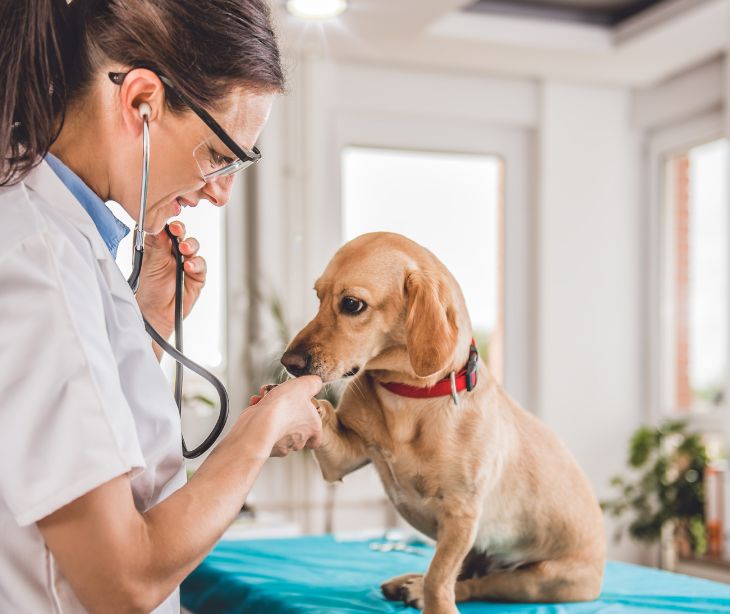
HIPAA is specifically designed to protect the privacy and security of individuals' health information, and it pertains only to humans, not animals. However, other laws and regulations govern the privacy of animal health information, which may vary depending on the context and jurisdiction.
Application to humans
HIPAA protects people's health information, but it doesn't cover animals like pets, livestock, or animals used in research. This means that veterinarians and other animal healthcare workers don't have to follow HIPAA rules when handling animals' medical records or information.
Related:
Animal health considerations
- Veterinary confidentiality: Veterinarians are ethically and legally obligated to maintain the confidentiality of their patients' health information.
- State laws: Many states have enacted specific statutes or regulations addressing the confidentiality of animal health records that outline the requirements for record-keeping, disclosure of information, and consent from pet owners for certain procedures or treatments.
- Industry standards: Organizations like the American Veterinary Medical Association (AVMA) set rules for handling animal health information. These rules cover data security, informed consent, and communication with clients.
- Research and education: When animals are used for research or education, additional regulations may apply to ensure that these animals are treated ethically. These regulations protect animal welfare and might involve oversight from review boards or animal care committees.
Related: HIPAA compliance when conducting research
Laws that protect animals
Laws protecting animals exist at various levels of government and encompass a range of issues related to animal welfare, conservation, and rights. Here are some examples of laws that protect animals:
Animal Welfare Act (AWA)
AWA sets standards for the humane care and treatment of animals in research, exhibition, transport, and commercial breeding operations. However, the Act does not cover pets.
Endangered Species Act (ESA)
ESA protects threatened and endangered species and their habitats by prohibiting activities that may harm these species and providing measures for their recovery and conservation.
Humane Slaughter Act
This federal law regulates the treatment of animals in slaughterhouses and ensures that they are handled and slaughtered in a humane manner to minimize suffering.
State animal cruelty laws
Each state has its own set of laws prohibiting animal cruelty and providing penalties for offenders. These laws prohibit actions such as neglect, abandonment, physical abuse, and animal fighting.
Wildlife conservation laws
States and federal agencies have laws and regulations in place to protect wildlife populations and their habitats. These laws govern hunting, fishing, trapping, and other activities that may impact wildlife.
Marine Mammal Protection Act (MMPA)
MMPA protects marine mammals such as whales, dolphins, seals, and sea lions from harassment, hunting, and capture. It also establishes conservation measures for their populations.
Companion animal laws
Many states have laws regulating the ownership and treatment of pets, including requirements for licensing, vaccination, spaying/neutering, and pet care standards.
Animal fighting laws
Federal and state laws prohibit animal fighting activities and impose penalties for those involved in organizing, participating in, or attending such events.
Laws protecting service animals
The Americans with Disabilities Act (ADA) protects the rights of individuals with disabilities who use service animals, ensuring their access to public places and accommodations.
International agreements and treaties
Various international agreements and treaties, such as the Convention on International Trade in Endangered Species of Wild Fauna and Flora (CITES), regulate the international trade of endangered species and protect them from exploitation.
Privacy laws for animals
While HIPAA does not apply to animals, various laws and regulations govern the privacy and protection of animal health information. These may vary depending on factors such as the species of the animal, the purpose of the healthcare service, and the jurisdiction in which the care is provided. Laws and regulations that apply to animal health include:
- Veterinary practice acts: These are laws enacted at the state or provincial level that govern the practice of veterinary medicine. They outline the requirements for licensing, standards of care, and disciplinary actions for veterinarians.
- Animal welfare laws: These laws protect the welfare of animals and cover various aspects of animal care, including housing, transportation, and veterinary treatment.
- Food safety regulations: Regulations governing the production and sale of animal products, such as meat, milk, and eggs, include requirements related to animal health and disease control. These regulations ensure the safety and quality of food products derived from animals and may involve measures such as disease testing, vaccination, and biosecurity protocols.
- Import and export regulations: Countries often have regulations governing the import and export of animals and animal products to prevent the spread of diseases across borders.
- Disease control and surveillance: Many countries have rules to manage animal diseases. These rules include notifying authorities about certain illnesses, quarantines and isolation, and making sure animals get vaccines.
- Research and testing regulations: Some laws and regulations control how animals are used in research, testing, and teaching. They make sure animals are treated well, supervised by institutions, and follow welfare rules. Researchers may also need to obtain permits or approval from ethics committees or regulatory agencies before conducting studies involving animals.
- Pharmaceutical and biologics regulations: The development, manufacture, and sale of veterinary drugs and biologics are subject to regulatory oversight to ensure safety, efficacy, and quality.
- Environmental regulations: These laws are aimed at protecting the environment, and may also impact animal health, in industries such as agriculture and aquaculture.
See also: HIPAA Compliant Email: The Definitive Guide
FAQs
What should I do if I have concerns about the privacy of my pet's health information?
If you have concerns about the privacy of your pet's health information, you should discuss them with your veterinarian or the relevant healthcare provider. They can provide information about their privacy policies and procedures, address any questions or concerns you may have, ensure that your pet's health information is handled appropriately, and follow applicable laws and regulations.
How do veterinarians protect the privacy of animal health information?
Veterinarians have ethical and legal obligations to maintain the confidentiality of their patients' health information, including animals. They may do so by implementing policies and procedures to safeguard electronic and paper records, obtaining informed consent from pet owners for treatment, and disclosing information only as permitted or required by law.
Why doesn't HIPAA apply to animals?
HIPAA doesn't apply to animals primarily because it is a federal law enacted to protect the privacy and security of individuals' health information in the context of human healthcare. The law was specifically designed to regulate how healthcare providers, health plans, and other entities handle protected health information (PHI) related to human patients.
Subscribe to Paubox Weekly
Every Friday we'll bring you the most important news from Paubox. Our aim is to make you smarter, faster.




